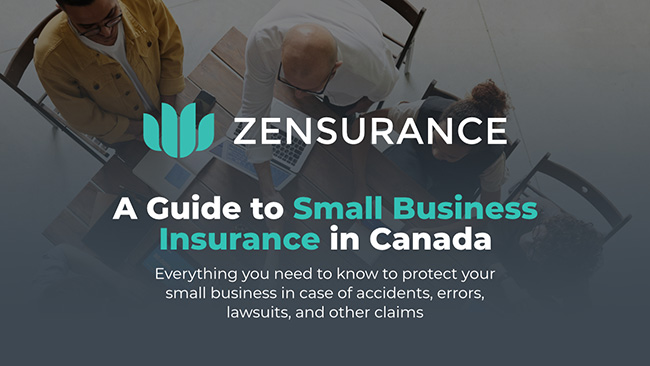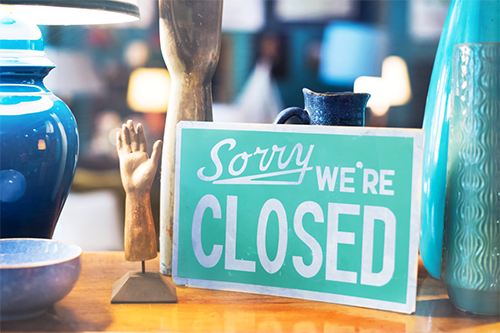There are many upsides for small business owners, startups, side hustlers, and independent professionals running their enterprises out of their homes.
The benefits of running a business out of your home include lower overhead costs and no commuting required, you can determine the work-life balance that suits you best in a comfortable environment, and there are potential tax deductions for a portion of your expenses, such as utility bills, property taxes, and mortgage interest.
Alas, there are also challenges. These may include space constraints for office equipment, inventory and meeting clients; zoning laws in your municipality may restrict certain types of businesses operating in a residential area and fewer opportunities for spontaneous networking with others.

Download Our FREE Insurance Guide
Learn everything you need to protect your small business.
Whitepaper download
"*" indicates required fields
Your email address will be used by Zensurance to provide latest news, offers and tips.
You can unsubscribe at any time.

Related Posts
Categories
Despite the many entrepreneurs successfully operating from their residential dwellings, it’s crucial to remember that even a home-based business requires a commercial insurance policy tailored to its unique needs. The importance of this cannot be overstated, as there are numerous compelling reasons why such a policy is essential.
With the aim of safeguarding your financial wellness, we present eight practical ways to effectively minimize damage and liability risks to your home-based business:
1. Coverage for Your Vehicle
If you have a business vehicle or use one for commercial purposes, will a personal car insurance policy adequately cover it, or do you need commercial auto insurance? Check your existing personal auto policy to know if you’re covered for using your wheels for business and what coverage limits it provides.
2. Protect Your Inventory and Business Contents
Although you’re running a business out of your primary residence, you may need commercial property coverage to protect your business contents (electronics, office equipment) and inventory or merchandise you sell. Commercial property insurance covers damages and losses because of fire, water, natural disasters, theft, and vandalism.
3. Know Your Risks Selling Goods Online
You should get product liability insurance if you sell products through your website or a third-party marketplace like Amazon or Etsy. It covers you for third-party bodily injury and third-party property damage claims by your customers that are caused by the items you manufacture, distribute, or sell.
4. Conduct Routine Maintenance
Reducing the possibility of damage to your home office and the house requires regular maintenance to prevent minor issues from becoming significantly large and expensive problems. For example, if there are cracks in your home’s foundation, seal them to prevent water from leaking into your basement.
5. Have a Back-Up Plan
You never know when something might go wrong that threatens your home-based business, be it a cyber-attack, an evacuation order from your local authorities, or severe weather that knocks out the power and internet access to your home for days or weeks. That’s when a business continuity plan can help. It’s a strategic document you turn to in such circumstances to keep your business running by minimizing downtime, protecting your assets, and maintaining your services that could otherwise interrupt your normal operations.
6. Have a Dedicated Workspace
It’s wise to separate your business life from your personal life. Create a dedicated workspace separate from your living area to reduce the risk of personal activities affecting your concentration and usual operations. Furthermore, check out these six tips to reduce work-related injuries and stress while working from home (because they happen to home-based business owners, too).
7. Maintain Accurate Business Records
Keep detailed records of business transactions, contracts, and communications to protect against claims or legal disputes. You might be surprised to learn that Canadian consumers aren’t afraid to sue a small business owner if they feel they’ve been wronged somehow. Accurate records of transactions and communications with your customers can help defend yourself in a lawsuit.
Also, create and maintain an up-to-date inventory list of your business contents and equipment if you need to file a claim. For example, if a fire damages or destroys your property, it will be critical to provide your insurer with a detailed list of what needs to be repaired or replaced.
8. Have Your Customers Sign Contracts
If you provide professional services as a business consultant does, use written contracts for customers to sign that outlines your terms of service, payment deadlines, and responsibilities to prevent misunderstandings and legal issues. It’s worthwhile to consult a lawyer who can draft and review contracts to ensure your interests are protected.
What Type of Insurance Does a Home-Based Business Need?
Don’t assume a homeowner insurance policy will cover your home-based business. Not all homeowner policies do, or they may lack adequate coverage for your independent company.
What a business insurance policy for a home-based company or independent professional requires depends on what you do, the products and services you provide, where you’re located, and several other factors about your business. Generally, a policy for a home-based business may include the following coverages:
- General liability insurance covers third-party bodily injury and third-party property damage claims made by customers or visitors to your property, such as a delivery person. For example, if a customer or courier visits your home and trips and falls on your property and is hurt, you may be liable to pay their medical expenses.
- Commercial property insurance may also be called business contents insurance. It protects your home office and your business’s most critical physical assets, including equipment, technology, merchandise, and inventory.
- Product liability insurance is essential if you sell any product (including food) to the public. It’s designed to cover you for property damage or bodily injury claims due to a product you sell, manufacture, or distribute.
- Professional liability insurance is vital if you offer professional services. It’s also called errors and omissions (E&O) insurance. It covers you against claims alleging professional negligence, misconduct, or failure to deliver a service as promised.
- Cyber liability insurance covers costs associated with cyber breaches. If your website, email and social media accounts, cloud storage, or point-of-sale (POS) system are compromised by a cyber-attack or data breach that exposes confidential patient information, cyber insurance is designed to help you recover by paying for legal advice, credit monitoring and crisis management expenses, and restoring the affected software systems.
How to Get Low-Cost Insurance for a Home-Based Business
Zensurance can help you get low-cost coverage to protect your home-based business.
Fill out our online application for a free quote. Let our knowledgeable brokers shop the market for you to find the right policy that suits your business and budget and customize it to your specifications. Our online application is designed to be easy and straightforward, giving you the confidence that you can protect your home-based business without breaking the bank.
Related Posts
How Plumbers Can Get Low-Cost Insurance to Work in High Rises
High-rise plumbers working in individual units are responsible for installing or repairing complex plumbing systems. Get the lowdown on getting the coverage you need, avoiding accidents, and keeping your premium low.
What Small Businesses Need to Know About Cyber Insurance
Data shows that 69% of Canadian small businesses don’t consider cybersecurity a financial priority, and only 20% have any intention of purchasing cyber insurance. Here’s why those small businesses need to get serious about cybersecurity.
Understanding Business Interruption Insurance Before Winter Hits
Winter weather can force you to close for a few days (or worse) unexpectedly. That’s why now’s the time to give business interruption insurance thought. Here are your options and how business interruption coverage can protect your income if forced to close temporarily.
Sign Up for ZenMail
"*" indicates required fields








